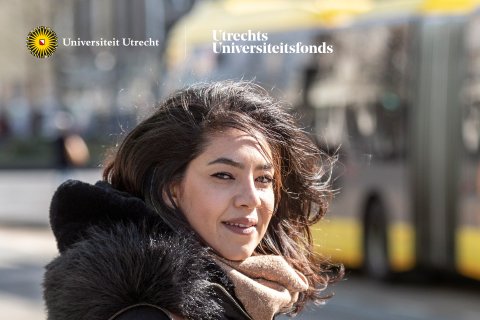Empowering women through education
‘The way the Rosanna Fund provides both financial support and shows solidarity is wonderful’

‘Who is this?’ Huda Al Baker was on the train when a voice on the telephone told her she would receive a grant from the Rosanna Fund for Women. Laughing: ‘I didn’t believe it. I had never won anything in my life! I was one of four women to get a grant in 2019. We all have different backgrounds: Dutch, Iraqi, Palestinian. Two of us are refugees. Rosanna stands for participation and solidarity and helps underprivileged women - regardless of their background - who want to pursue a career in higher education.’
As a Palestinian refugee, Huda lived in Syria before coming to the Netherlands in 2015. ‘Education has always been my most important goal. I remember my grandmother saying: ‘Leaving your family, your house, your properties, your country; you will be ok as long as you are educated. This will protect you anywhere in the world.’
Finding out about Incluusion was an important step
Different culture
‘When I first tried to find my way to university here, it was very overwhelming. Without any guidance, I browsed through all the websites comparing one university to another and visited open days to figure out the differences. At the same time, I tried to build my life here, learn Dutch and improve my academic English. It was quite a challenge, since I come from a different culture and lifestyle, with a different way of interacting. For instance, I still find it difficult to address teachers by their first name.
‘Finding out that my diploma from Syria is not recognised as a university bachelor here was devastating. Thankfully, I found out about Incluusion. They help status holders to attend courses at Utrecht University. Finding them was an important step, as it allowed me to follow preparatory courses for a Master’s programme and subsequently helped me to get admitted to the Master’s in Conflict Studies and Human Rights. And I learned more about Dutch society and culture in the process.’
Talented female researchers
It was also Incluusion that recommended that Huda apply for the Rosanna Fund. Straight away, she was fascinated and passionate about the idea behind the fund. ‘Two female professors establishing their own organisation aimed at talented, underprivileged female scholars. Providing them with financial assistance during their academic education to help them reach the next professional step. No matter their background, status or religion. To me, the idea and how it creates solidarity between women is wonderful. I respect this so much and am glad to be part of it, carrying it on to the next generations of women.
‘The grant is beneficial in many ways. Financially for my field research, providing money to cover travel and accommodation expenses, and to do interviews by phone. But Rosanna also offers moral support. I have built friendships with the ‘Rosanna women’. We meet every so often to share our experiences, which helps us to understand each other better. This understanding will not only benefit us, as a ‘Rosanna family’, I’m confident it will also have an impact on generations of women to come. It also reflects diversity within and outside the university, in more ways than just percentages and numbers. In general, understanding and empathising is what matters, sympathising alone is not enough.'
Every change starts with education
‘Where will I be in a few years? I prefer to think step by step. That’s something I’ve learned through my experiences in Syria. See, I had never imagined being in the Netherlands, and even now, I don’t know where I will be next. First, I would like to continue my research on the interactions and identity of a Palestinian faction; a military group fighting beside the Syrian regime since the revolution erupted. After my Master’s, it would be great to have the opportunity to start practical work, preferably in conflict zones. And I would definitely like to do a PhD in the future.
I think it will be beneficial to draw from my personal experience. Growing up in an educated and politically engaged family, I was continually informed about Palestinian issues, national issues in Syria and the region around us. This naturally influenced me as a child, and it now helps me to get a better read of the context in conflict zones. It motivated me to seek ways to mitigate the impact of the conflict on people in their daily life. And now, along with my life experience, I can use the research methods, theories and ways of thinking I was introduced to at Utrecht University.
‘In the end, I think every change starts with education. Particularly for women in higher education, funding can be an obstacle, which is why we have to make sure to pass on Rosanna’s message of solidarity.’
This article also appeared in the Annual Report of the Utrecht University Fund.

